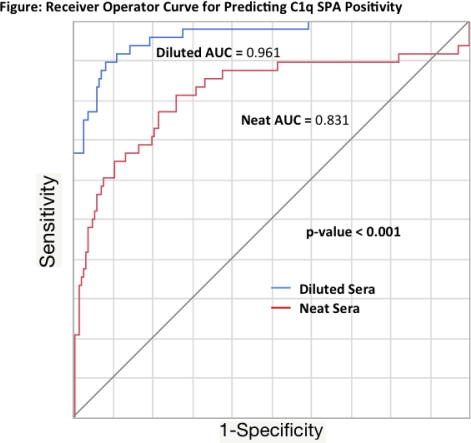Dilution of Patient Sera Improves MFI Correlation with Complement Fixation in Solid Phase Assay Assessment.
1Pediatric Cardiology, Washington University School of Medicine, St. Louis, MO
2Histocompatibility Laboratory, Barnes-Jewish Hospital, St. Louis, MO
3Surgery, Washington University School of Medicine, St. Louis, MO.
Meeting: 2016 American Transplant Congress
Abstract number: 18
Keywords: Heart transplant patients, HLA antibodies, Pediatric
Session Information
Session Name: Concurrent Session: Challenges in Hearts and VADs - Striking Back
Session Type: Concurrent Session
Date: Sunday, June 12, 2016
Session Time: 2:30pm-4:00pm
 Presentation Time: 3:30pm-3:42pm
Presentation Time: 3:30pm-3:42pm
Location: Room 309
Background: Median Fluorescent Intensity (MFI) by solid phase assays (SPA) has been used to determine risk of donor-recipient reaction prior to transplant. Inconsistency of this screen is believed to be due to a prozone effect, as some low MFI antibodies are able to bind complement. We aim to determine if MFI on dilution is superior to undiluted (neat) sera at predicting complement fixation of human leukocyte antigen (HLA) antibodies.
Methods: Histocompatibility testing was performed using sera from pediatric patients referred for heart transplant evaluation at a single institution. The most recent sample or sample closest to transplant were chosen for assessment. Patient samples were run neat and diluted to a 1 to 25 concentration. HLA testing was then performed using a Luminex-based SPA. Complement fixation was tested using the commercially available C1qScreen (One Lambda, Inc). Receiver operator curves (ROC) were constructed using C1q positivity as the predictor.
Results: A total of 46 patients (median age 9 years, IQR 3.2-19.3) had HLA testing. Of these, 24 patients had 283 discrete HLA antibodies (171 class I and 112 class II). Using a MFI cutoff of 2,000; 274 (96.8%) were positive on neat analysis, 82 (29.0%) were positive on dilution, and 55 (19.4%) with C1q. There were 10 (3.5%) antibodies that demonstrated prozone effect where MFI increased on dilution and 9 antibodies (3.1%) that were negative on both neat and dilution testing but positive by C1q. Excluding antibodies positive by C1q only, the area under the curve (AUC) of dilution MFI was significantly better than that of the AUC for neat MFI (0.961 vs. 0.813, p<0.001, figure).
Conclusion: A significant number of HLA antibodies are negative on both dilution and C1q SPA. Though infrequent, a prozone effect can be found after diluting patient sera. Dilution of patient samples improves the ability of MFI to predict complement fixation by C1q SPA.

CITATION INFORMATION: Castleberry C, Phelan D, Simpson K, Mohanakumar T, Canter C. Dilution of Patient Sera Improves MFI Correlation with Complement Fixation in Solid Phase Assay Assessment. Am J Transplant. 2016;16 (suppl 3).
To cite this abstract in AMA style:
Castleberry C, Phelan D, Simpson K, Mohanakumar T, Canter C. Dilution of Patient Sera Improves MFI Correlation with Complement Fixation in Solid Phase Assay Assessment. [abstract]. Am J Transplant. 2016; 16 (suppl 3). https://atcmeetingabstracts.com/abstract/dilution-of-patient-sera-improves-mfi-correlation-with-complement-fixation-in-solid-phase-assay-assessment/. Accessed July 12, 2025.« Back to 2016 American Transplant Congress
